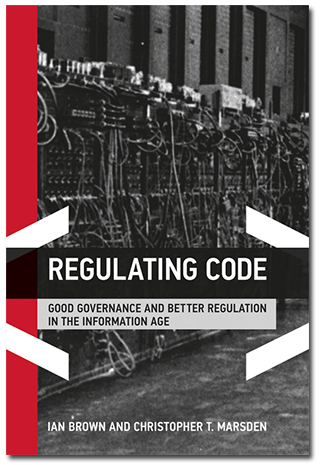Regulating Code, review: A campaigning book

The early days of the internet were marked by a dualistic attitude towards regulation. The arrogant 'technology-rules' camp insisted that the internet couldn't be functionally regulated, while the paranoid camp feared that whatever regulation was tried would be damaging. Twenty years later, we still see these warring attitudes — often coexisting uneasily in the same people. Witness the debate that sprang up in response to David Cameron's announcement a few weeks ago that he intended to push forward with nationwide filtering of objectionable web content. The weird thing is that both positions are true.

As Ian Brown and Christopher Marsden write at the outset of Regulating Code, we are entering the third decade of internet regulation. I hadn't thought of it that way, but it's a reasonable contention. The internet began to reach popular attention with the 1993 release of Mosaic, which opened up the web, and the 1994 withdrawal of acceptable use policies barring commercial traffic. Although many of today's battles have their roots in the very earliest online interaction, before that pair of developments there wasn't much to regulate. After them, however, governments quickly became interested, and by 1996 the Grateful Dead lyricist John Perry Barlow was writing A Declaration of the Independence of Cyberspace to tell them that regulating the internet was none of their business. As Brown and Marsden write, few would now agree (and many did not agree even at the time).
Brown, now a research fellow at the Oxford Internet Institute, is a long-time researcher and activist; his work is well-known to anyone interested in digital rights and the work of Privacy International, the Open Rights Group or the Foundation for Information Policy Research. Marsden, the author of two books on internet regulation and network neutrality as well as several others, was a professor at the University of Essex School of Law when this book was published, although he has since moved to the University of Sussex, where he's been a Professor of Media Law since April 2013.
Brown and Marsden examine how regulation has and has not worked in five particularly contentious areas: privacy and data protection; copyright; censorship; social networking; and network neutrality.
Douglas Adams once summarised the development of civilisations in three phases: Survival, Inquiry and Sophistication, otherwise known as the How, Why and Where phases. For example: How can we eat? Why do we eat? Where shall we have lunch? Brown and Marsden sum up the first two decades this way: libertarian (1993-2002), and re-regulatory (2003-2012) — the latter in response to the dot-com bust and emphasis on security after the 9/11 attacks. The authors don't have a catchy term for what comes next, but try to ask questions that will lead to more useful approaches than we've seen in the past. How do code and law interact? How do we use regulation to support the things we want, such as innovation and respect for human rights?
To answer these questions, Brown and Marsden examine how regulation has and has not worked in five particularly contentious areas: privacy and data protection; copyright; censorship; social networking; and network neutrality. In a following analysis chapter, they compare a best-practice approach with the worst-case ('sledgehammer') approach. This would be the difference between, for example, the widespread yet voluntary adoption of SSL versus attempts to legislate key escrow; spam filtering and takedown versus super-injunctions to reveal Twitter and Google users, and so on. For many problems, they propose interoperability and standards as solutions. Not so much code as law, more code as enabler. Bad regulation closes off possibilities and lets monopolies happen; good regulation opens up new possibilities.
This is not a book you'll read for entertainment, nor is it a business book. Instead, it's something rarer: a serious and thoughtful look at how we might resolve the dilemmas that have plagued us for 20 years. It's a campaigning book — but in a subtle and evidence-based way.
Regulating Code
By Ian Brown and Christopher T. Marsden
MIT Press
267 pages
ISBN: 978-0-262-01882-1
£27.95